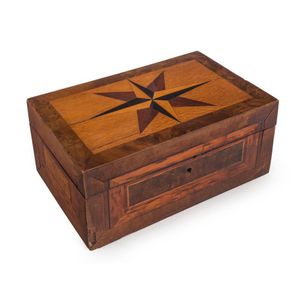Antique Starburst Box with Various Timbers
An antique box with starburst top, various timbers including casuarina beefwood, musk, mottled kauri, cedar, ebony, acacia and marri, 19th century 12.5 cm high, 28 cm wide, 17.5 cm deep
You must be a subscriber, and be logged in to view price and dealer details.
Subscribe Now to view actual auction price for this item
When you subscribe, you have the option of setting the currency in which to display prices to $Au, $US, $NZ or Stg.
This item has been sold, and the description, image and price are for reference purposes only.
- Casuarina - Casuarina, is also known as beefwood (because of its appearance) she-oak, swamp oak, river oak, forest oak and Botany Bay wood. It is a native Australian hardwood, red brown in colour with dark flecks.
- Ebony - Ebony is a close grained timber, black in colour. It has a fine texture which can be polished to a high gloss, making it suitable for venereering, inlay and stringing and its use as solid timber is resticted to small decorative items and ornamental decoration, such as chess pieces and musical instrument parts. The term "ebonised" means "faux ebony", timber that has been darkened during the polishing process to resemble ebony.
- Musk Wood - The musk is native to Tasmania, and is found in the rainforests and wetter regions especially along river banks. It grows to a height of between five and fifteen metres, it has a musk scent. A rare timber and therefore mainly used as a veneer in the 19th-century, it is light brown in colour and furniture constructed from it is very expensive.
- Kauri - An evergreen conifer tree associated with New Zealand, but also grown in northern Australia, and islands around the Pacific rim including Borneo, Vanuatu and New Guinea. The timber is generally golden in colour, and straight grained without much knotting.
A by-product of the kauri tree was the kauri gum, the fossilised resin extracted from the tree. The gum was obtained through digging, fossicking in treetops, or more drastically, by bleeding live trees. Kauri gum was used in the manufacture of varnishes and other resin-based products, and also crafted into jewellery, keepsakes, and small decorative items.
Kauri forests were prolific in the north of the North Island of New Zealand. European settlers in the 1700 and 1800s realised that the timber from these tall trees with broad trunks would be ideal for ship building and construction and a thriving industry was established harvesting the kauri tree. The forests were substantially reduced, and now the remaining Kauri trees that grow in New Zealand are protected, and there are reserves in various areas of the North Island.
The remaining stands of kauri in New Zealand are under threat from "kauri disease", a microscopic organism that causes dieback in the trees, with vast tracts either dead or dying.
This item has been included into following indexes:
- boxes, material or decoration
